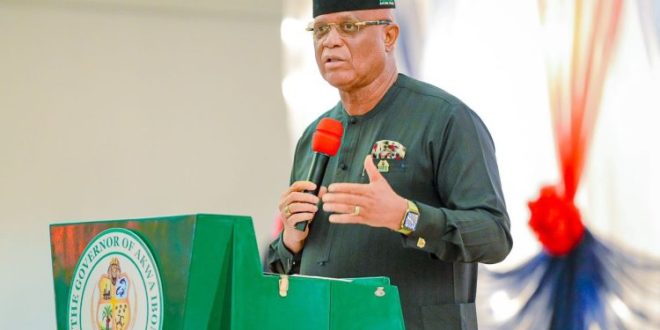Subsidised food items will be sold to vulnerable persons already enlisted in the state’s social register.
Source: Premium Time By Saviour Imukudo
Governor Umo Eno of Akwa Ibom State has rejected an appeal to include “eggs” among the food items that the state government will sell to vulnerable people at a subsidised rate.
The governor turned down the appeal on Thursday during an enlarged State Executive Council meeting, where he signed into law the bill establishing the Bulk Purchase Agency.
Nigerians are facing severe hardship as prices of food items have skyrocketed following the removal of petrol subsidy by President Bola Tinubu.
In response to the ballooned prices of commodities, Governor Eno, weeks ago, forwarded to the state assembly, a bill for the establishment of a Bulk Purchase Agency which will buy food items in bulk and sell to the vulnerable people at a subsidised rate.
According to the law, the agency has three staple food items – rice, beans and garri on its menu. The items are to be sold at 10kg each, and once a month to the vulnerable people already enrolled in the state social register.
One attendee at the ceremony, which was live-streamed on Facebook, queried the modalities employed in selecting the three food items, arguing that garri and rice are carbohydrates while beans is the only protein on the list.
He suggested the inclusion of eggs, another protein source, particularly for the malnourished children in the society, but the governor dismissed the appeal.
“Poor people don’t eat eggs. Let’s look at staple foods,” the governor responded, while emphasising that the programme, being an intervention, will not last forever.
“We all know that there is real hunger in the land. Our people need food, so as a government, we proposed that we intervene in the high cost of food in our state.
“The only way we can do that is to set up an agency that will do a direct intervention in the market and get food to our people at a reduced price – that is what the agency seeks to address,” he said.
Criteria, vouchers for beneficiaries
Closely followed by the bill-signing ceremony was a presentation by Frank Ekpenyong, an aide to the governor on ICT, and a representative of the Nigeria Security Printing and Minting Company PLC, a company that handles voucher printing.
Giving details of the scheme, Mr Ekpenyong said the state government selected the accredited market agents that will sell the staple food items to the beneficiaries, who are to pay 70 per cent while the government subsidises 30 per cent, including a provision of five per cent as service charge (interest) to the market agents.
The agency will provide vouchers to qualify individuals enabling them to buy staple foods through accredited market agents, the governor’s aide said.
“The people will take the vouchers to the accredited agents and get garri, beans and rice once a month – not more than 10kg of each of these items.
“The agents will take the vouchers to the government and claim their money with 5 per cent interest as a service charge,” Mr Ekpenyong added.
Explaining the security feature on the voucher to the governor, who queried if any other printing company cannot produce the voucher, a representative of the Nigerian Security Printing and Minting Company, said the papers are customised and cannot be imported to the country without the approval of the Central Bank of Nigeria, a description that suggest that the papers for voucher printing may be as expensive, if not more than the food items.
Other concerns
Raising concerns after the presentation, the chairperson of the Nigeria Labour Congress in the state, Sunny James urged the governor to expand the scheme to accommodate everybody resident in rural areas, particularly workers, whom he said their take-home pay cannot take them home.
“The situation we are in the country, it will be wrong not to make food available for our people,” he said.
Mr James further suggested patronising local printers for the vouchers as according to him past experiences with the CBN had shown that sometimes the cost of printing the nation’s currency is often higher than the value of the naira itself.
He asked if the government or consumers would pay the five per cent service charge as contained on the vouchers, particularly for the price of garri, which is estimated to cost N7,000 for a 10kg bag.
“The figures are still tentative,” Governor Eno responded. “That’s why you don’t see a price on this voucher right now.
 HEROESNEWSGH The Biggest Gh News Platform
HEROESNEWSGH The Biggest Gh News Platform





